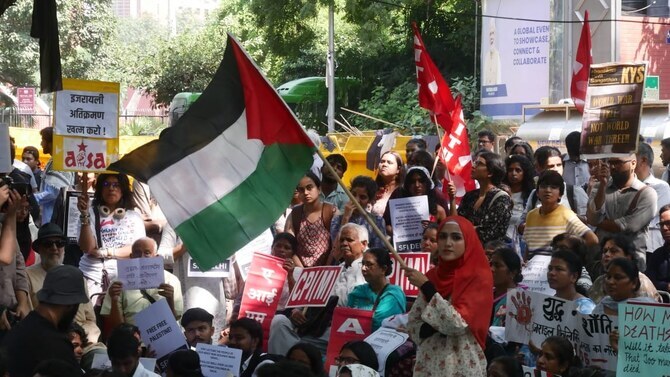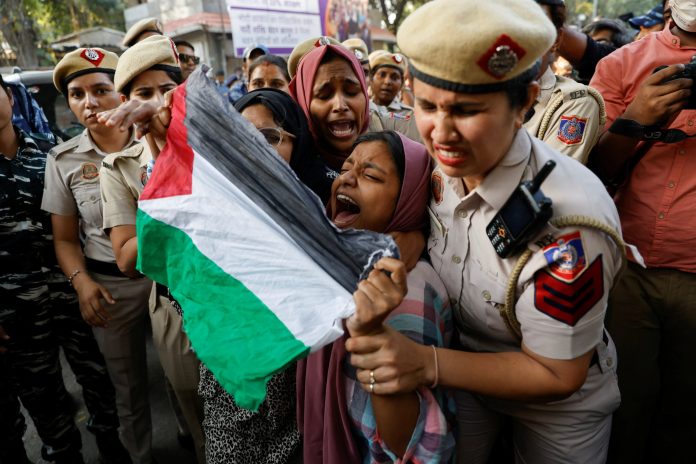– Amatur Rahman
India, which is known as a democratic country, is criminalizing, filing charges and FIRs, and detaining people for holding peaceful protests and demonstrations, even though these are part of the people’s constitutional right to freedom of speech and expression. This has become a normal occurrence in India.

According to an Al Jazeera report, over the past two years, Israeli attacks in Gaza have resulted in the deaths of at least 67,000 Palestinians, including approximately 20,000 children. This equates to one child killed every hour for the past 24 months. Pro-Palestinian protests have been held globally through marches, social media campaigns, and boycotts to condemn Israeli actions and support Palestinians’ rights.
The Indian government supports Palestine at the United Nations and has condemned the killing of civilians in Gaza.
However, since October 7, 2023, several people across India have been criminalized for standing in solidarity with Palestine. Many have been arrested, detained, and had to face FIRs for holding peaceful protests, demonstrations, raising flags, or even sharing social media posts in support of Palestine.
On September 5, 2025, an FIR was registered against the Girls Islamic Organization (GIO) in Kerala for raising pro-Palestinian slogans, flags, and banners. A report by Maktoob said the FIR was registered under BNS Sections 189(2), 191(2), 190, and 192 for rioting and being part of an unlawful organization.
Article 14 traced 17 FIRs in at least seven Indian states, in which 51 people have been booked under various sections for organizing pro-Palestine rallies or posting pro-Palestine content on social media.
On October 16, 2023, in Bengaluru, hundreds of people staged a protest to express solidarity with Palestine. Police detained 25 of them, alleging that by assembling on the footpath, they disturbed public movement and violated a court order allowing protests only in a designated park.
Those detained included a 20-year-old shopkeeper who waved a Palestinian flag during a Muharram procession in Uttar Pradesh.
Colin Gonsalves, a senior advocate practicing in the Supreme Court, stated, “Booking anyone for protesting against Israel is completely unconstitutional. Peaceful protest is a part of freedom of speech and expression, and these arrests are illegal.”
In Aligarh, four AMU students were booked for joining a solidarity march on their college campus. The FIR alleged that the students marched in support of a “terrorist group.”
Bajrang Dal activists, objecting to the AMU students’ support for the Palestinian cause, burned an effigy of Hamas and chanted slogans such as “Down with Palestine, down with Hamas” near a police station.
On October 16, 2023, at least 60 people were detained in New Delhi for organizing a pro-Palestinian demonstration demanding diplomatic support for Palestine and denouncing Israel’s actions in Gaza.
The Urdu daily Inquilab reported that Delhi Police issued notices to mosque imams, directing them not to include prayers for Palestine during religious gatherings.
In Jammu and Kashmir, multiple mosques including the historic Jamia Masjid in Srinagar were closed for Friday prayers. Shia imam Aga Syed Mohammad Hadi stated that authorities placed him under house arrest on several occasions in October and November 2023, preventing him from leading prayers as a way to silence expressions of solidarity with Palestinians.
He added, “Initially, police allowed us to condemn Israel’s atrocities inside mosques, but later they said we can only pray for Palestine in Arabic, not in the local Kashmiri language.”
Many other processions have also been targeted. During the annual Youm al-Quds rally where Shia Muslims voice support for Palestine, police ordered that no rallies be held. A handout cited by Article 14 stated: “Holding a pro-Palestine rally has been banned by the authorities. Whoever takes it out shall be dealt with as per law. FIRs will be lodged against the person.”
On March 13, 2024, a 29-year-old student in Srinagar was summoned after posting pro-Palestine protest photos. Police deleted the images from his phone and warned him against sharing such content in the future. According to Article 14, he was questioned for uploading images depicting dummies representing Palestinians killed by Israeli forces.
Chennai Police detained around 40 members of the Students Federation of India (SFI) for attempting to stage a pro-Palestine protest outside the US Consulate.
On May 17, 2024, Jammu police booked 27-year-old Aqib Javed for distributing posters urging a boycott of Israeli products in support of Palestine. His lawyer stated that peaceful protest and solidarity with oppressed communities are protected under India’s Constitution.
In Bengaluru, police detained 15 activists for over five hours. The activists had intended to distribute pro-Palestine pamphlets and posters.
On July 15, 2024, three individuals were arrested in Bihar for waving a Palestinian flag during a Muharram procession.
That same day, Swarn Prabhat, Superintendent of Police in Gopalganj, Bihar, issued a video statement declaring that “controversial items like Palestinian flags” are “completely banned.”
Bengaluru Police have reportedly disrupted several events expressing solidarity with Palestine even those planned to be held indoors.
In Madhya Pradesh, four individuals were booked and detained for waving a Palestinian flag following complaints from Bajrang Dal members.
Three Muslim students at RGNIYD said they were unfairly suspended after being falsely labeled “anti-national” for raising slogans like “Free Palestine” and “Jai Bhim.”
Pro-Israel protests in India face no legal action
There have also been public expressions of support for Israel. On November 11, 2023, hundreds participated in a “Pune Stands with Israel” rally to show solidarity with Israel.
Indian social media also saw a surge of pro-Israel posts and narratives.
Similarly, in Ahmedabad, a group held a public march with placards and banners saying “We stand with Israel.”
However, there have been no legal actions taken against individuals or groups in India for participating in pro-Israel rallies or expressing support for Israel on social media. In contrast, several incidents have been reported where individuals expressing solidarity with Palestine have faced legal consequences. This highlights a growing bias in how authorities respond to different political and ideological expressions, raising concerns about freedom of speech and equal treatment under the law. Police across Indian states, particularly in BJP-ruled states, have largely criminalized pro-Palestine protests.
Across countries, including India protesters have faced police action, detentions, and restrictions. Peaceful demonstrations have been met with criminal charges, and expressions of solidarity with Palestine have been suppressed under the pretext of maintaining public order.
On March 28, 2025, Jammu and Kashmir Police filed cases under the Unlawful Activities (Prevention) Act (UAPA) against unidentified protesters for raising pro-Palestine and pro-Hezbollah slogans during a Muharram procession.
In Delhi, police detained over 30 peaceful protesters outside the Israeli Embassy who were denouncing Israel’s ongoing genocide in Gaza.
In Hyderabad, a Palestine solidarity march organized by the EFLU Students’ Union at Sagar Square turned violent after ABVP members arrived post-demonstration, shouted provocative slogans, and vandalized Palestinian flags and posters. The clash escalated when ABVP members allegedly assaulted students. Protesters claimed police sided with the ABVP, ignored the vandalism, and ordered the removal of all Palestine-related materials. A student wearing a keffiyeh was reportedly dragged and detained with police support. The organization said in a statement, “Even before the protest could begin, a group of jingoistic nationalist mobs attacked the peaceful gathering.” It further said that the mobs objected to the Palestinian flag and began chanting hate slogans.
In Goa, police detained several pro-Palestine protesters who were demonstrating against Israel genocide in Gaza.
Prof. V.K. Tripathi, a 77-year-old retired physics professor from IIT Delhi, and his daughter Rakhi Tripathi, were conducting a nonviolent campaign in solidarity with Gaza. He distributes pamphlets, raises awareness, and fasts in protest of the violence in Gaza. In the evening, Delhi Police officers arrived, questioned them, and allegedly misbehaved, raising their voices, being rude, attempting to stop the video recording, and started interrogating them.
In Delhi, a protest organized by several student organizations including Fraternity, MSF, AISF, Disha, and ASA at Delhi University was attacked by cadres of the Hindu right-wing student group ABVP. Students holding a peaceful Palestine solidarity protest were violently disrupted by Hindutva groups and later faced false charges.
Citing students, Maktoob reported that Hindutva members physically assaulted several protesters, tearing down placards. When Delhi Police arrived, they allegedly attacked the protesters, beating students, manhandling women participants, and detaining many of them.
Targeting students and activists has become a common tactic in India to suppress dissenting voices and discourage expressions of solidarity with war-torn Palestine.




